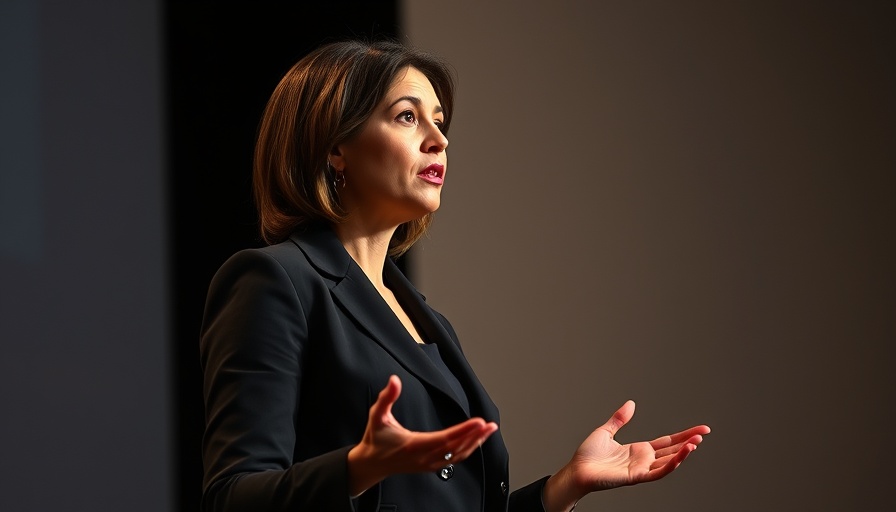
Reimagining Grief in the Digital Age
Grief has often been seen as a linear journey towards closure, marked by memorials, rituals, and visits to graves. However, Cattleya Daub's poignant talk at TEDxAPU reveals a fresh perspective on this age-old experience. Rather than viewing grief as something one needs to 'move on' from, she emphasizes a modern approach: engaging with the memories of loved ones through social media, specifically Facebook, which serves as an evolving testament to their lives.
In 'Why I refuse to unfriend my dead mom,' Cattleya Daub delves deep into how technology reshapes our understanding of grief, offering key insights that we are expanding on in this article.
Continuing Bonds: The Digital Memory
Daub introduces the concept of 'continuing bonds,' a theory that suggests the connections we have with deceased loved ones can persist and evolve, particularly in the virtual space. For many, engaging with the digital remnants of those who have passed can foster a sense of connection and community. As she poignantly points out, her mother's Facebook page is not just a profile; it is a living memorial filled with stories and cherished memories, showcasing the multifaceted life of her mother.
Grief, Technology, and Modern Relationships
In a world increasingly dominated by digital interaction, technology reshapes our grief experience. Daub's reluctance to memorialize or unfriend her deceased mother highlights how social networks can act as a dynamic platform for expressing and processing grief. The interactions and memories shared by friends on her mother’s profile create an organic community of remembrance, affirming that grief is communal as much as it is personal.
The Emotional Spectrum of Digital Grieving
Daub's reflections also resonate with another crucial point: grief can encompass a spectrum of emotions, including regret, anger, and ultimately love. Revisiting her mother's posts stirs various feelings, revealing layers of her past relationship. This evolving emotional landscape underscores that grief management isn't a simple task of forgetting or memorializing; it's about developing an ongoing relationship with memory.
The Role of Social Media as a Virtual Graveyard
The metaphor of social media as a "virtual graveyard" captures the essence of how we navigate loss in a digital context. With studies indicating that engagement on memorialized profiles can increase over time, it's clear that social media platforms can transform our understanding of mourning, allowing us to maintain connections with the deceased in a form that feels enriching and validating.
Connection in Isolation: The Power of Community
During the pandemic, many faced profound isolation, with traditional grieving practices, like funerals, curtailed due to health regulations. Daub's narrative encapsulates this period of solitude, showcasing how, in the face of such isolation, social media became a lifeline—a space where family and friends could share stories and find comfort in collective remembrance. It is through this communal experience that the bonds of grief can be creatively translated into love and resilience.
Creating Meaning from Loss through Art and Storytelling
Perhaps the most transformative aspect of Daub's insights lies in her assertion that grief can catalyze creativity. In sharing memories and stories, we not only cherish the lives of those we've lost, but we also inspire ourselves to create. This process of storytelling and artistic expression emerges as a healing mechanism, turning pain into something beautiful and meaningful. Daub exemplifies how engaging in this kind of creative memorializing can reshape how we remember our loved ones.
Conclusion: Moving Forward with Love
Ultimately, Cattleya Daub's TEDx talk challenges us to rethink and reframe our relationship with grief in the era of technology. As she encapsulates, grief doesn’t signify a closing chapter; instead, it provides avenues to continue loving those who have passed away. The digital landscape we inhabit allows for a vibrant tapestry of memories, conversations, and connections that breathe life into the concept of loss. Technology, far from being a barrier, becomes a powerful tool for transformation, enabling us to carry the love we hold for our lost ones into a new chapter of our lives. In recognizing the unique role that social media plays in navigating grief, we can find inspiration and innovation in our shared human experience.
 Add Row
Add Row  Add
Add 




Write A Comment